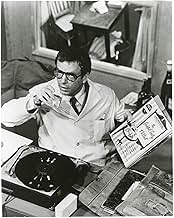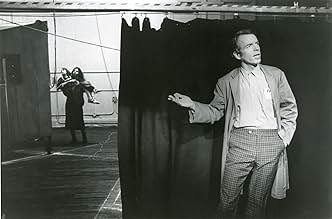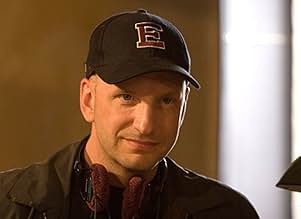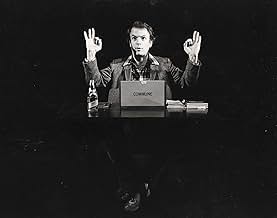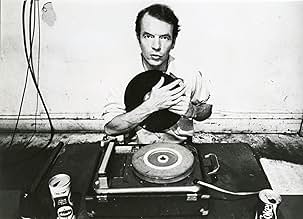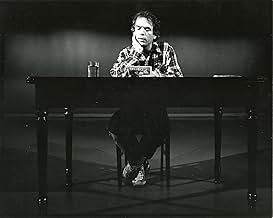IMDb-BEWERTUNG
7,1/10
1325
IHRE BEWERTUNG
Füge eine Handlung in deiner Sprache hinzuA look at the art of Spalding Gray who drew from real life experience to create a compelling and deeply personal series of monologues.A look at the art of Spalding Gray who drew from real life experience to create a compelling and deeply personal series of monologues.A look at the art of Spalding Gray who drew from real life experience to create a compelling and deeply personal series of monologues.
- Regie
- Hauptbesetzung
- Auszeichnungen
- 1 Nominierung insgesamt
Forrest Gray
- Self
- (Archivfilmmaterial)
- (Nicht genannt)
Kathie Russo
- Self
- (Archivfilmmaterial)
- (Nicht genannt)
Handlung
WUSSTEST DU SCHON:
- WissenswertesThis film is part of the Criterion Collection, spine #617.
- VerbindungenFeatures Spalding Gray: A Life in Progress (1988)
- SoundtracksTubthumping
Written by Danbert Nobacon, Dunstan Bruce, Alice Nutter, Louise Watts, Paul Greco, Darren Hammer, Allen Whalley and Judith Abbot
Performed by Chumbawamba
Ausgewählte Rezension
You know that question, "What would you like people to say about you after you're gone?" We answer with either, "I don't care," or maybe a short litany of qualities and our small contributions to the world, trusting our mumbled tone and contrite expression suitably convey an appropriate degree of humility. Then the follow-up kicks in, "So what sort of things do you do now to be that person?"
Director Steven Soderbergh admits he is probably more character-driven than plot-driven. The 'who' not the 'why.' The person, and the inner strength they display. And in this uncommented documentary, we share his fascination for one man. A man who in turn examines his own life or that of others in such a absorbing way that, seen through Soderbergh's crystal lens, it may probably cause you to ask your own ghosts, "But aren't you part of my life too?"
The 'story' is of one Spalding Gray. Probably the foremost of autobiographical monologue raconteurs. He slips with passionate and articulate ease, from living the moment, to observing himself living the moment. Gray's method, as he describes it, is to recount real stories from his (both happy and tortured) life until they become embellished with innuendo and hyperbole. He jokes that it is almost like 'reverse Method Acting'. Instead of throwing the emotional reality of a past intense experience forward into a present dramatisation, he takes the vagaries with which we view memories, and uses them to make his life narrative at once compelling, honest and instructive. "I like telling the story of life better than I do living it," he says. Gray acknowledges he is a 'born actor,' in the sense that he lives his life as a stage. And yet it displays a sincerity and wholeness that makes one think, "Am I as self-aware in my own life?" And if, after all, you were trying to encapsulate your life while living it, how exactly do you go about it?
Gray is no new-age super-guru or remote larger-than-life character. By occupation, a successful experimental actor and solo performer. But still as a man that struggles his whole life, not only with the sort of challenges each of us face, but with the added burdens of hereditary depression and bipolar tendencies. He is foremost a human being. His 'dark underbelly' is as important as his achievements. Normally hidden ordeals – a difficult upbringing, sexuality and relationships, thoughts about death and suicide – are used positively as foundation blocks. Where many of us would ignore, Gray embraces, analyses, and ultimately transcends.
Soderbergh's low key technique is instrumental. Without it, we would have an entertaining and dramatised monologue (such as the 1987 film of Gray's play and book, Swimming to Cambodia). With it, we get closer to the core of the man's psyche. It's almost a handbook on getting there. Probably the most minimalist of Soderbergh's movies, And Everything is Going Fine has no talking heads, no voiceovers, no perceptible agenda. Points from Gray's stories are illustrated with relevant segments from interview footage. Soderbergh almost goes back to the early roots of Sex, Lies and Videotape, making us acutely aware of the filmic process – and then letting us get caught up in it. Everything is Going Fine opens with a sustained fixed shot of an empty chair and desk, using grainy film. It is an image that may well long be associated with Gray, his chosen podium of storytelling. The disparity between what is acknowledged as 'performance' yet capturing truth is a dilemma of the cinematic process itself. Yet here it swiftly becomes a memorial to the fine art of documentary film-making: to become a lens for the truth instead of focussing our attention on the story filmmakers want us to see. In terms of techniques, Shirley Clarke's equally penetrating Portrait of Jason at first comes to mind, or Herzog's Grizzly Man; but whereas Clarke and Herzog expose a truth, Soderbergh's subject is both complicit, self-reflective and ennobling. Every frame is pre-existing footage rather than shot anew for cinema.
To counter inevitable loneliness produced by a work ethic that makes an art form of self-examination, Gray starts to interview others on stage. He demonstrates a rug-pulling capacity to get at a person's innermost demon, probably because he has lived with and conquered his own. He asks a woman if she has ever contemplated suicide. When she says no, his surprise is as if she had said she has never eaten chocolate. Further probing, although never intrusive, reveals that she has indeed contemplated suicide. The interview becomes an enthralling conversation between two people who find they are quite comfortable discussing the most harrowing of personal events.
Gray's self-honesty produces the words that Soderbergh uses in this epitaph to a life lived. Gray captures his own past, prophesises his own future and his life becomes a poem.
Steven Soderbergh's films have frequently obsessed over identity, the way we perceive it, project it, define it. How we make ourselves into the character which we play in our own life story. Defining someone in terms of their sexual experiences (Sex, Lies and Videotape). The plastic medium of an amorphous personality (in his much underrated, The Girlfriend Experience). And observing emotional drive without dramatising the emotion (as in Che). Is it always entertainment? Probably not. And in this case, even the humour, replete as it is with literary references, is aimed more at the educated audience and one that will think well beyond the screening.
For anyone who ever doubted Soderbergh's artistic integrity, this unassuming film is a minor monument to excellence of execution and the enduring validity of his work. And an eloquent eulogy not even just to one man, but to the struggle for excellence and self-actualisation in all of us.
Director Steven Soderbergh admits he is probably more character-driven than plot-driven. The 'who' not the 'why.' The person, and the inner strength they display. And in this uncommented documentary, we share his fascination for one man. A man who in turn examines his own life or that of others in such a absorbing way that, seen through Soderbergh's crystal lens, it may probably cause you to ask your own ghosts, "But aren't you part of my life too?"
The 'story' is of one Spalding Gray. Probably the foremost of autobiographical monologue raconteurs. He slips with passionate and articulate ease, from living the moment, to observing himself living the moment. Gray's method, as he describes it, is to recount real stories from his (both happy and tortured) life until they become embellished with innuendo and hyperbole. He jokes that it is almost like 'reverse Method Acting'. Instead of throwing the emotional reality of a past intense experience forward into a present dramatisation, he takes the vagaries with which we view memories, and uses them to make his life narrative at once compelling, honest and instructive. "I like telling the story of life better than I do living it," he says. Gray acknowledges he is a 'born actor,' in the sense that he lives his life as a stage. And yet it displays a sincerity and wholeness that makes one think, "Am I as self-aware in my own life?" And if, after all, you were trying to encapsulate your life while living it, how exactly do you go about it?
Gray is no new-age super-guru or remote larger-than-life character. By occupation, a successful experimental actor and solo performer. But still as a man that struggles his whole life, not only with the sort of challenges each of us face, but with the added burdens of hereditary depression and bipolar tendencies. He is foremost a human being. His 'dark underbelly' is as important as his achievements. Normally hidden ordeals – a difficult upbringing, sexuality and relationships, thoughts about death and suicide – are used positively as foundation blocks. Where many of us would ignore, Gray embraces, analyses, and ultimately transcends.
Soderbergh's low key technique is instrumental. Without it, we would have an entertaining and dramatised monologue (such as the 1987 film of Gray's play and book, Swimming to Cambodia). With it, we get closer to the core of the man's psyche. It's almost a handbook on getting there. Probably the most minimalist of Soderbergh's movies, And Everything is Going Fine has no talking heads, no voiceovers, no perceptible agenda. Points from Gray's stories are illustrated with relevant segments from interview footage. Soderbergh almost goes back to the early roots of Sex, Lies and Videotape, making us acutely aware of the filmic process – and then letting us get caught up in it. Everything is Going Fine opens with a sustained fixed shot of an empty chair and desk, using grainy film. It is an image that may well long be associated with Gray, his chosen podium of storytelling. The disparity between what is acknowledged as 'performance' yet capturing truth is a dilemma of the cinematic process itself. Yet here it swiftly becomes a memorial to the fine art of documentary film-making: to become a lens for the truth instead of focussing our attention on the story filmmakers want us to see. In terms of techniques, Shirley Clarke's equally penetrating Portrait of Jason at first comes to mind, or Herzog's Grizzly Man; but whereas Clarke and Herzog expose a truth, Soderbergh's subject is both complicit, self-reflective and ennobling. Every frame is pre-existing footage rather than shot anew for cinema.
To counter inevitable loneliness produced by a work ethic that makes an art form of self-examination, Gray starts to interview others on stage. He demonstrates a rug-pulling capacity to get at a person's innermost demon, probably because he has lived with and conquered his own. He asks a woman if she has ever contemplated suicide. When she says no, his surprise is as if she had said she has never eaten chocolate. Further probing, although never intrusive, reveals that she has indeed contemplated suicide. The interview becomes an enthralling conversation between two people who find they are quite comfortable discussing the most harrowing of personal events.
Gray's self-honesty produces the words that Soderbergh uses in this epitaph to a life lived. Gray captures his own past, prophesises his own future and his life becomes a poem.
Steven Soderbergh's films have frequently obsessed over identity, the way we perceive it, project it, define it. How we make ourselves into the character which we play in our own life story. Defining someone in terms of their sexual experiences (Sex, Lies and Videotape). The plastic medium of an amorphous personality (in his much underrated, The Girlfriend Experience). And observing emotional drive without dramatising the emotion (as in Che). Is it always entertainment? Probably not. And in this case, even the humour, replete as it is with literary references, is aimed more at the educated audience and one that will think well beyond the screening.
For anyone who ever doubted Soderbergh's artistic integrity, this unassuming film is a minor monument to excellence of execution and the enduring validity of his work. And an eloquent eulogy not even just to one man, but to the struggle for excellence and self-actualisation in all of us.
- Chris_Docker
- 18. Juni 2010
- Permalink
Top-Auswahl
Melde dich zum Bewerten an und greife auf die Watchlist für personalisierte Empfehlungen zu.
- How long is And Everything Is Going Fine?Powered by Alexa
Details
- Erscheinungsdatum
- Herkunftsland
- Offizieller Standort
- Sprache
- Auch bekannt als
- Untitled Spalding Gray Project
- Produktionsfirma
- Weitere beteiligte Unternehmen bei IMDbPro anzeigen
Box Office
- Bruttoertrag in den USA und Kanada
- 22.080 $
- Eröffnungswochenende in den USA und in Kanada
- 7.035 $
- 12. Dez. 2010
- Weltweiter Bruttoertrag
- 22.080 $
- Laufzeit1 Stunde 29 Minuten
- Farbe
- Seitenverhältnis
- 1.33 : 1
Zu dieser Seite beitragen
Bearbeitung vorschlagen oder fehlenden Inhalt hinzufügen

Oberste Lücke
By what name was And Everything Is Going Fine (2010) officially released in Canada in English?
Antwort

